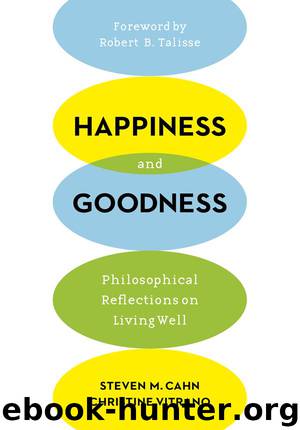Happiness and Goodness: Philosophical Reflections on Living Well by Steven M. Cahn & Christine Vitrano

Author:Steven M. Cahn & Christine Vitrano [Cahn, Steven M.]
Language: eng
Format: epub
Tags: PHI005000, SEL016000, Self-Help/Personal Growth/Happiness, Philosophy/Ethics and Moral Philosophy
Publisher: Columbia University Press
Published: 2015-06-08T19:00:00+00:00
CHOOSING THE EXPERIENCE MACHINE
A central issue about happiness is whether its value depends on how it is achieved. Suppose someone could be made happy by having illusory experiences. Would anyone welcome that possibility?
This question lies at the heart of a frequently cited and widely admired thought experiment offered by Robert Nozick. He conceives the following hypothetical situation: “Suppose there were an experience machine that would give you any experience you desired. Superduper neuropsychologists could stimulate your brain so that you would think and feel you were writing a great novel, or making a friend, or reading an interesting book. All the time you would be floating in a tank, with electrodes attached to your brain…. Would you plug in?”
Nozick presumes that no one would choose this option and offers three reasons. First, “we want to do certain things, and not just have the experience of doing them.” Second, “we want to be a certain way, to be a certain sort of person.” Third, “plugging in … limits us to a man-made reality.” He concludes that because we would not use an experience machine “something matters to us in addition to experience.”1
In the decades since Nozick posed this puzzle and presented his solution, virtually all philosophers have taken his treatment as conclusive. Almost no one has argued that people would choose the experience machine.2
To find such unanimity is unexpected, but the situation is especially surprising because Nozick’s conclusion appears mistaken. In support of this view, we shall offer various reasons why an individual might be inclined to choose the experience machine. We illustrate these by the use of examples at least as plausible as the experience machine itself.
First, consider cases in which people may not desire to do certain things but instead want to have the experience of doing them. For example, one of the pleasures of going to the movies is having the opportunity to experience adventures we would not risk in reality. While safe in our plush seats, we can feel the excitement of skiing precipitously down a steep mountain, participating in dangerous international intrigue, or battling a typhoon. Yet how many of us actually wish to do any of these things?3 Such cases demonstrate that using an experience machine is not in principle objectionable. The only controversial issue is the length of time for which you would be willing to employ it.
The cinema, however, is not the only case in which we seek appearance rather than reality. Consider the popularity of bungee jumping, roller coasters, aggressive computer games, or reenactments of Civil War battles. All these activities offer participants the experience of pursuing thrilling adventures without facing the possible consequences of the real-life activities they simulate.
Another sort of escape from reality is offered by psychedelic drugs. Nozick notes that these are viewed by some “as mere local experience machines,” but he does not draw the inference that their widespread use suggests that many would welcome the opportunity not only to drop out but also to plug in.4 A similar point could be made about the widespread use of alcohol to distort reality.
Download
This site does not store any files on its server. We only index and link to content provided by other sites. Please contact the content providers to delete copyright contents if any and email us, we'll remove relevant links or contents immediately.
| Exegesis & Hermeneutics | New Testament |
| Old Testament |
The Five People You Meet in Heaven by Mitch Albom(3545)
The Secret Power of Speaking God's Word by Joyce Meyer(3142)
Real Sex by Lauren F. Winner(3000)
Name Book, The: Over 10,000 Names--Their Meanings, Origins, and Spiritual Significance by Astoria Dorothy(2962)
The Holy Spirit by Billy Graham(2932)
0041152001443424520 .pdf by Unknown(2833)
How The Mind Works by Steven Pinker(2801)
ESV Study Bible by Crossway(2768)
Ancient Worlds by Michael Scott(2661)
Churchill by Paul Johnson(2564)
The Meaning of the Library by unknow(2552)
The ESV Study Bible by Crossway Bibles(2543)
The Gnostic Gospels by Pagels Elaine(2515)
MOSES THE EGYPTIAN by Jan Assmann(2406)
Jesus by Paul Johnson(2347)
City of Stairs by Robert Jackson Bennett(2335)
The Complete Dead Sea Scrolls in English (7th Edition) (Penguin Classics) by Geza Vermes(2268)
The Nativity by Geza Vermes(2217)
Ancient Near Eastern Thought and the Old Testament by John H. Walton(2213)
